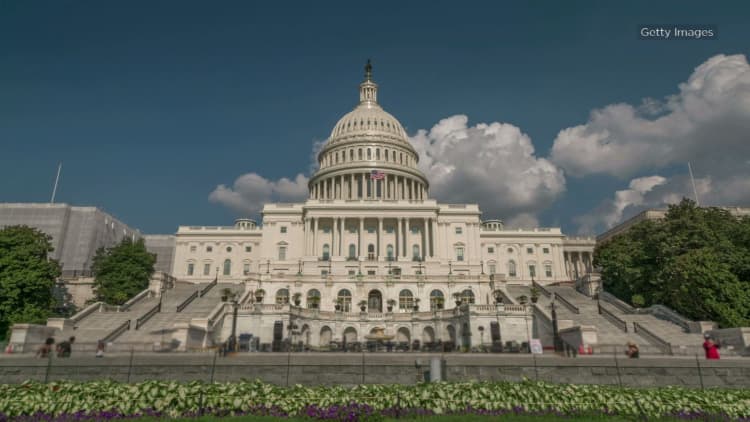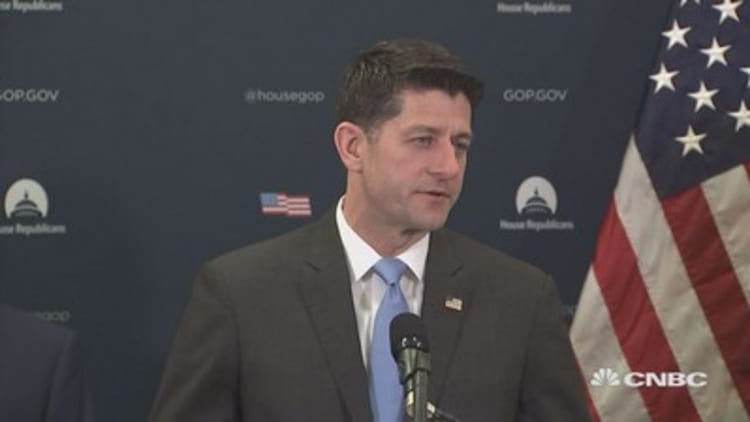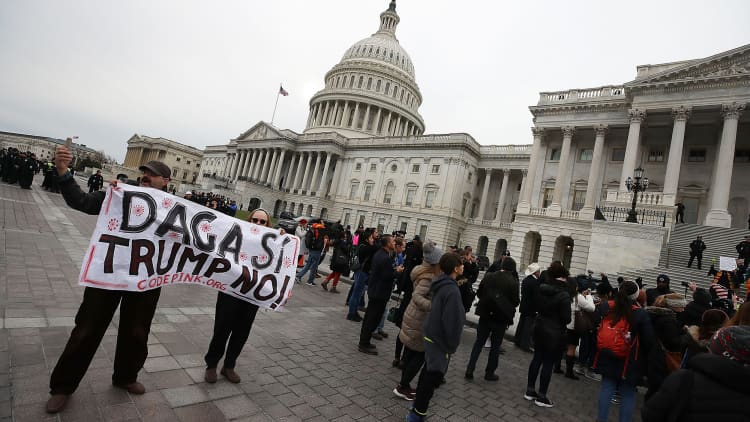
Republicans hope to release the details of a spending bill Tuesday after delays that raised the risk of missing a Friday deadline to fund the government.
Congress aims to pass its $1.3 trillion spending plan by midnight Friday or risk seeing the government's spending authority lapse for the third time this year. But snags in the negotiations, rules in both the House and Senate, and a snowstorm expected to hit Washington on Wednesday all complicate the voting timeline.
House Republican leaders aim to release the bill by midnight Tuesday and vote on it by Thursday afternoon, members leaving a conference meeting Tuesday morning told CNBC. That timeline leaves a tight window for passage, and the potential for issues, in both the House and Senate.
"There's some unresolved issues, we're working through them, and we're hoping to post today," House Speaker Paul Ryan told reporters Tuesday after the meeting. He added, "We're not talking about" a stopgap funding bill to keep the government open and allow more time for negotiations.
Senate Majority Leader Mitch McConnell said Tuesday that he anticipates his members would have "plenty of time" to review the bill once it is filed, but he left open the possibility that a final vote could come after Friday's deadline.
"We're going to do it this week. As long as it takes, that's the time we'll put in to get there," he told reporters.
Democrats also signaled progress in the discussions, with Senate Minority Leader Chuck Schumer saying both sides were working hard to reach an agreement.
"It has some things no one likes and it has some things not everybody likes, but most people like," Schumer said Tuesday on the Senate floor. "It was a fair compromise."
Negotiations on the legislation to fund the government through the end of September have slowed, despite a deal in Congress earlier this year setting spending levels. Familiar points of contention such as immigration and health care have tripped up the talks.
The conservative wing of the House Republican caucus, in particular, has expressed problems with the legislation. The conservative Freedom Caucus, for instance, plans to oppose the bill, according to its chairman, Rep. Mark Meadows, R-N.C.
Rep. Mark Walker, head of the separate conservative Republican Study Committee, said he saw some progress in the talks.
"It's going in the right direction," Walker, also a North Carolina Republican, said. "I think there's a little more optimism from a conservative perspective."

He cautioned that the developments do not mean all conservatives will "cross the line" and support the package.
Plenty of variables are still at play, such as disagreements over whether to use the bill to shore up Obamacare markets and whether to fund a $900 million rail tunnel project connecting New Jersey and New York City. Funding for increased border enforcement, protections for hundreds of thousands of young undocumented immigrants and President Donald Trump's proposed border wall are also points of contention.
Those provisions were unlikely to go in the final legislation as of Tuesday morning.
The House has a rule that allows members three days to read a bill before a vote, but lawmakers reportedly waived it in a bid to speed up the process.
The Senate also requires a lengthy debate, but the chamber could move forward more quickly with consent from every senator present.
However, an expedited process in the Senate is not guaranteed. Sen. Rand Paul, R-Ky., held up a vote to avoid a shutdown last month over concerns about busting through budget caps with a $300 billion boost to military and domestic spending over two years. He could do so again this week.
On Monday, Meadows had told CNBC there were "zero" chances of a shutdown.
WATCH: This is what happens when the U.S. government shuts down



